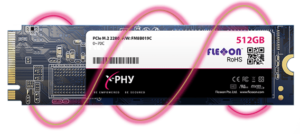Nexus Industrial Memory specialises in the provision of memory-based products designed especially for applications where commercial solutions are simply not secure enough, rugged enough or have no guaranteed long-term availability.
Nexus Industrial Memory will be showcasing some of the electronics industry’s most secure embedded memory solutions on stand C75 at Southern Manufacturing & Electronics on 8-10th February in Farnborough and again at ECS on 19th May at the Kassam stadium, Oxford, including Flexxon’s X-PHY solid state drives (SSD); as recently selected by Lenovo to be at the heart of what are expected to be the world’s first ‘all-in-one’ AI cybersecurity laptops. The SSDs are proving popular in embedded systems as security is implemented in the drive’s firmware, which monitors for threats in real-time and locks down the moment a threat is detected. Nexus will be running demonstrations at ECS to simulate cyber-attacks on the X-PHY.
Also on show will be a wide range of Flexxon’s memory ICs, cards and modules. Flexxon’s solutions include ICs (such as SLC NAND flash and eMMC ICs), SSDs (including SATA II and III, PATA, PCIe NVMe) and standard form factor removable memory drives and cards.
The industry’s most secure removable memory drive technology will be on show too. ATEK’s Datakey CryptoAuthentication memory tokens are ideal for the transfer of passwords, security keys, certificates, sensitive data or system configuration files. The tokens employ Microchip CryptoAuthentication high-security hardware ICs, features of which include a unique and non-changeable 72-bit serial number (set by Microchip), a 512bit one-time programmable zone, a random number generator and a SHA-256 hash algorithm for data encryption.
Nexus are an added value distributor known for providing superior levels of support to engineers in instances where a memory solution has needed to be designed into a new product or system from scratch or to upgrade (or rather evolve) their systems and products when legacy memory solutions start failing or become susceptible to cyberattacks.






